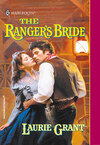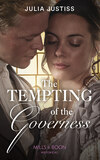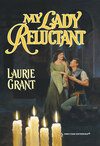Kitabı oku: «The Ranger's Bride», sayfa 4
Addy, imagining how the couple must have felt, said nothing.
“But surely you can understand why I could not possibly bring myself to tolerate such a scandalous couple living across the street from my innocent daughter, can’t you?” Her tone indicated Addy’s answer had better be yes, if she hoped for continued business with the mayor’s wife.
Addy would have loved to say that Lucy would probably be better off living with the supposedly scandalous couple than with such a judgmental woman as her mother, but she could not afford to. The disapproval of a pious busybody like Olympia Fickhiser could make Addy’s living on her own in this town financially impossible.
“Of course I can see why you would feel that way,” she hedged. It was women like Olympia Fickhiser who would have made Addy’s life in St. Louis hell after her divorce.
And what on earth would Olympia do if she knew Addy was harboring the Ranger in her bedroom, a man she had just met on the stage yesterday?
As if to echo her thoughts, just then a thud sounded from the back of the house, followed by a muffled sound that Addy thought might be a groan.
“What was that?” Olympia demanded suspiciously. “Is someone here?”
Good Lord, had Rede fallen out of bed? Addy leaped to her feet, throwing the gown on the chair she had just vacated.
“No, of course not,” she called over her shoulder. “I was moving a stack of books to my bedroom when you came, and it sounds as if they’ve fallen over. Let me just check—”
“But that second noise—it sounded like a cry of pain.”
“I thought so, too, Mama,” Lucy said, obviously eager to get back into her mother’s good graces by agreeing with her.
“No, I’m sure you’re mistaken,” Addy assured them, eager to run to the bedroom, her mind full of visons of Rede hemorrhaging from a reopened wound while Olympia Fickhiser babbled on. “It’s an old house, and it makes all sorts of odd noises, especially in hot weather like this.”
“Nonsense, this house isn’t that old. Your uncle built it only ten years ago.” It appeared that the mayor’s wife had every intention of following her back to the bedroom.
She had to get to Rede, but she had to stop the woman from coming with her! “I—I—I hesitate to tell you this, Mrs. Fickhiser,” Addy said desperately, “for I’m sure you’ll think it’s too silly for words, but my aunt wrote me that she’d seen the ghost of my uncle in the house. Of course, I don’t believe such a faradiddle, but my family is Scots-Irish, and you know how fanciful the Irish can be….”
Mrs. Fickhiser turned as white as the lace trim on the high neckline of her dress. “I—we have to be going,” she said, rising unsteadily to her feet. “You may deliver the dress when you’re finished with it.”
Addy watched out the window as Olympia Fickhiser, her daughter in tow, ran out the front door and into her waiting buggy.
She could barely suppress a groan of her own. Now the mayor’s wife would tell everyone the seamstress’s house was haunted, or if she feared to appear foolish, that Adelaide Kelly was mentally deranged enough to believe it was!
But she couldn’t worry about that now. She had to find out what had caused the loud thud in the back bedroom.
Chapter Seven
Addy came bursting into the room, her eyes wild and anxious, calling, “Rede, are you all right? I heard a noise—” She stopped short when she spied him sitting on the bedside chair, his feet propped comfortably on the bed.
“Sorry, Miss Addy. Didn’t mean to alarm you none. I was just a mite clumsy the first time I tried gettin’ up, and knocked the chair over on the floor. It hurt some, makin’ sure I didn’t go over with it.” He put a hand on his ribs, hoping to engage her sympathy, but her expression didn’t change. “Is that loudmouthed old biddy gone? I could hear every word she said, clear back here. I swear she could talk the hide off a longhorn bull.”
Her green eyes kindled and her lips tightened. “You shouldn’t have gotten up without help anyway, Rede Smith! You’re lucky you didn’t fall and tear open your wound! And that ‘loudmouthed old biddy,’ as you call her, is one of my best customers—or was,” she corrected herself while glowering at Rede. “Now she probably won’t ever come again, and she’ll tell everyone in Connor’s Crossing I’m demented, and then no one else will have their dresses made here, and I’ll either starve to death or have to beg my parents for my fare back to St. Louis—”
Rede held up a hand. “Now, just hold your horses! What on earth are you talking about, Miss Addy? Why will they think you’re demented? And why are you goin’ to starve to death?”
Some of the fire died from her eyes. “I—I jumped when I heard the thud, fearing you’d fallen or something,” she began. “That got Mrs. Fickhiser suspicious, and she demanded to know who was here. I tried to…cover up…by saying a stack of books I’d been moving must’ve fallen over, but she didn’t act like she believed me, and…” Now she bit her lower lip and twisted her hands together, looking away from him.
“And what?” he demanded. Lord, had Addy Kelly already given away the secret of his presence to the woman with the biggest mouth in the town?
“And I…oh, heavens, you’re going to think I’m such a silly goose…I implied it might be the ghost of my dead uncle.”
He stared at her, realizing he’d read embarrassment as guilt. He threw back his head and let out a hoot of laughter. “You told her your house might be haunted, yet you want to blame me for ruinin’ your business?”
She stiffened. “I didn’t say it was haunted, just that my aunt had told me that she had seen the ghost of my uncle in here. Oh, it was a complete lie, of course—my uncle was much too kind a man to frighten my aunt by appearing like that—but it was the first fib that popped into my head. I suppose I’m not a very good liar. It was wrong of me to blame you.”
He started to grin at the admission, but then he realized Addy wouldn’t have to be lying about anything if he wasn’t here hiding out at her house.
“I reckon it’s probably better for a person not to be a good liar,” he murmured. “But what kind of business are you in?” he asked, curious.
“I’m a seamstress,” Addy told him, raising her chin a little as she said it. “I sew dresses and do alterations. That’s the reason I was in Austin—buying supplies I couldn’t get at the mercantile here.”
“And you run your business out of your home? Why don’t you have your shop in town?”
“I inherited this place, not a place in town,” she said, a bit defensively. “I can’t afford to rent a shop in town—at least not yet,” she added. “It’s not so far beyond town that people mind coming here—or at least, they didn’t, until I convinced Mrs. Fickhiser the place was haunted, or that I was crazy.” Her brow furrowed in obvious anxiety.
“Your late husband didn’t leave you very well off, I take it?”
Rede was sorry as soon as the question left his lips. Her mouth tightened again, and she looked down at her lap.
“I’m sorry, Miss Addy,” he said quickly. “It ain’t any of my business.”
She raised her head, meeting his gaze squarely. “Indeed it isn’t. But since you asked, no, Charles did not leave me very well off. And I have not been in Connor’s Crossing very long. So I do depend on my good reputation to get my business established and keep it going.”
“Miss Addy, next time someone comes I’ll be so quiet you can hear a hummingbird’s heartbeat,” he promised, his hand over his heart. He was trying to make her smile again; and she started to, but then she got that worried look again.
“Well, hopefully you’ll be well enough to leave before too much longer,” she said briskly. “How long before you’ll be able to ride?”
“Oh, a few days,” he said, deliberately vague. He’d wanted to extend his stay, using her place as his base of operations, but it sure didn’t look like it was going to be easy to talk her into that. And that was too bad, because from what he’d been able to determine, Addy Kelly’s house was perfectly situated—far enough out of town that folks didn’t drop by without a reason, near enough to keep in touch with the news. And once he’d found the Fogarty hideout, Connor’s Crossing was surely big enough to have a telegraph office he could visit to summon his Ranger company.
He’d just have to convince Addy she had nothing to fear from his continued presence. But first, Rede, you’d better convince yourself. If he was allowed to stay, it was going to be awfully hard to keep his hands off the tempting young widow.
Just then he heard the distinct growl of her stomach.
Addy pressed a hand against her middle and blushed. “Excuse me! I was just about to fix dinner when Mrs. Fickhiser came—now it must be the middle of the afternoon! Could you eat a little something, Rede?”
Rede’s queasiness had long since left him, and he could eat more than “a little something.” In fact, he was now so hungry he could eat a horned toad backward, but he didn’t think it was polite to say so.
“Yes ma’am, I reckon I could.”
Two days later, Jack Fogarty rode into the hideout scowling—a bad sign, his men knew from past experience.
“Thought you said you saw the Ranger’s body when you rode back to look, Chapman,” Jack Fogarty snarled. Fogarty had been on a reconnaisance trip to Connor’s Crossing and swore as he pulled off the fake gray beard he wore as a disguise whenever he went into town.
Chapman, crouching over a pot of beans, stopped stirring and squinted up at the outlaw leader as the rest of the gang gathered around to listen. “I did, boss,” he insisted. “He had a Ranger badge on, right enough—just above the hole in his chest. What’s wrong?”
He never saw the swift fist that knocked him flat on his back, but when he opened his eyes, Fogarty’s angry face was scowling down on him.
“You damned fool! He warn’t no Ranger!” Jack Fogarty shouted down at him. “I went t’ claim the body at the undertaker’s in town, on behalf a’ the grieving widow in Llano, I told ’em—only to be told his carcass had already been taken away!”
Chapman blinked. “Already been taken away?” he echoed. “By who?”
“By his real wife—who said he was a shotgun guard, not a Ranger, and the undertaker told me she was right puzzled as to why her man had that Ranger badge pinned on his shirt. The undertaker was lookin’ all squinty-eyed at me, so I figgered I’d better hightail it outa there before he pointed me out to the sheriff.”
Fogarty’s voice was ominously quiet now, and Chapman felt a flicker of alarm. The leader of the Fogarty gang had been known to shoot a man for less cause than a mistake like this.
“So how would someone get a Ranger’s badge on his chest that wasn’t a Ranger?” Lew, one of the other outlaws, asked.
“That’s just what I’m wonderin’,” Fogarty growled, a murderous glare in his eyes.
“Sounds like someone wanted folks to think the Ranger was dead,” the man said carefully, keeping an eye on Fogarty.
“Especially us folks,” someone else muttered.
“Yeah, especially us,” Fogarty said, as if to himself. “Which means that Ranger we heard was on that stage is still alive.”
There was silence around the campfire as the outlaws considered the idea.
“You reckon we got double-crossed, Jack?” Clete Fogarty, his younger cousin asked.
Fogarty stiffened. “What d’ you mean?”
Clete shrugged. “You was told the Ranger’d be on the stage. What if the fella that tol’ you so was lyin’?”
“He wouldn’t dare.”
“What’s t’ stop ’im?” Clete retorted, careful to keep his voice nonchallenging.
Fogarty grinned and jerked his head meaningfully at the bony-thin woman who sat mending his shirt in the sparse shade of a mesquite tree, just out of earshot. “Mary Sue, yonder. She just happens t’ be my informant’s wife, ain’t she, Chapman?”
Chapman had been the only other one in on the secret, and now he puffed out his chest with pride—and secret relief that Fogarty no longer seemed angry at him. “That’s so,” he told the others, eyeing the female who was Fogarty’s sole possession.
“I figger he don’t want nothin’ t’ happen to his wife, even if she is a mite…wayward,” Fogarty said of the woman he’d enticed to run away with him. “He knows her life wouldn’t be worth two bits if he lied to me—or his neither.”
The casually uttered words cast a chill on the group, and they looked away from Fogarty’s expressionless eyes.
“So you’re sayin’ the Ranger had to have been on that stage,” Chapman said.
Fogarty nodded, rubbing his chin, which itched after wearing the fake beard. “I don’t remember seein’ a badge on any a’ the men we shot that day, come t’ think on it. Lessee, there was the driver that we plugged first,” he said, counting on his fingers, “that other fella on top that turned out t’ be the shotgun guard, that skinny little fellow with the derby hat…”
“Hoo-whee, I ’bout busted a gut when that silly li’l hat flew up in the air when you plugged ’im, boss!” one of the men snickered.
Fogarty’s jaw clenched. “I’m so glad I could amuse ya, Thompson,” he snapped. “Now, if we could stick to the subject—”
“There was that big fella dead on the floor a’ the coach,” Thompson said, eager to get back in the outlaw leader’s good graces again. “You know, the one that fell over the woman? Mebbe we got ’em both with the same slug, ya think?”
“Jack, I d-d-don’t f-f-figger he was the R-R-Ranger, noways,” Walt Fogarty, Clete’s brother, said with his usual stutter. “A b-b-big tub a’ l-l-lard like that!”
“But as I remember, there was one other gent on the stage,” Fogarty mused.
“Yeah—some dark-haired tall fella,” Chapman said. “Looked like a drifter. I shot ’im in the chest.”
Fogarty gave him a measuring look.
“Did ya? Did you check t’ see that he was dead when I sent you back for a look-see? Did you check all of them?”
Full of nerves and resentful that he’d been sent on this task, and eager to be safe back at the hideout, Chapman hadn’t done more than glance at each of the corpses. They’d sure as hell looked dead enough to him. He couldn’t admit that now, naturally. “’Course I did. They was all was dead, all right.”
“So…that leaves that wiry little fella with the derby hat who coulda been the secret Ranger, Chapman? Is that what you’re sayin’?”
Too late, Chapman saw the chasm yawning in front of him. He’d have done better to admit he hadn’t checked the bodies very closely.
He shrugged, ice closing around his heart.
“You’re sayin’ the man I shot while you were pluggin’ the other fella was the secret Ranger?” Fogarty persisted. “The one whose skull I let daylight into?”
The others chuckled uneasily.
“Or maybe it was the big fella whose blood was puddlin’ on the floor—or maybe even one of them women was really a Ranger dressed up like a gal, and wasn’t dead!”
Chapman took a step back. “Boss, I don’t know…I sure thought they was all dead, ’specially the one I shot—”
Fogarty whipped out his pistol and killed Chapman while the other man was still making excuses. Once a man lied to Jack Fogarty, he would never trust him again.
“Next time I want you fellas to be sure,” he told the others, who stood slack-jawed and wide-eyed with horror at the sudden killing of their compadre.
Chapter Eight
“Time for your dressing change,” Addy called as she swept into the room.
Two days of being confined to the small room had made Rede as restless as a caged cougar. “You sound awfully cheerful today,” he accused, scowling at her over the remains of his breakfast.
Addy blinked, then smiled tolerantly in a way that made him want to clench his fists. “Is that a crime, Ranger Smith?” she inquired with raised brows as she sat down by his bed, a freshly ironed bandage in hand. He felt her studying him.
“’Course not. So why are you so happy?”
“What dressmaker wouldn’t be, after getting the job of making not only Sally Renfrew’s wedding gown, but those of all four of her attendants and her mother?”
“Who’s Sally Renfrew?”
“Only the daughter of the area’s most prominent rancher.” Addy fairly sang the words. “I guess this means Olympia Fickhiser either didn’t say anything about my ghostly uncle,” she said with a wry chuckle, “or the Renfrews don’t care about her tales. And the wedding’s not till fall, so I have plenty of time.”
“Good for you. Guess that’ll keep the wolf from your door for a while,” he growled, and immediately wanted to take back what he’d said, or at least, the way he’d said it. His restlessness had made him cranky. But Rede couldn’t be as carefree about the passage of time as Addy was. Every day he had to hole up here, unable to do anything but eat, sleep, and have his dressings changed, was a day the Fogarty gang continued to run free—and he was further than ever from bringing honor back to his name.
He had to admit that Addy’s cooking was wonderful—the food she prepared was the sort of thing a man dreamed of during the monotony of beans cooked over a campfire and washed down with coffee. Because of the nourishing food, the long hours of sleep, and Addy’s nursing, he was getting stronger each day—but he was nowhere near ready to ride out in search of the Fogartys’ hideaway.
And Addy’s nearness was becoming a torment. After all, he hadn’t had a woman in a long time—even a saloon girl. And a lady like Addy Kelly was about as far from a saloon girl as Rede could imagine.
Ever since he’d grown to manhood, Rede’s mother had urged him to find a good woman and settle down. After her death a couple of years ago, and still a bachelor, Rede had joined the Rangers. Now he avoided meeting “good women”—ladies—like the plague. It was unfair to ask a lady to wait around for him when he was apt to be away for endless weeks chasing bandits and marauding Indians. He never knew when he’d be home—or when a bullet from a Comanche or an outlaw could put an end to his life. What gently bred female would want a man like that, anyway?
In the past, he had resorted to saloon girls if his needs became insistent enough, and if his Ranger company happened to be near enough to a town big enough to have a saloon or cantina. But purchased caresses had never done anything for the loneliness of his soul.
“Why don’t you just unbutton your shirt, Rede, and we’ll change that bandage?” Addy said as she bent toward his shoulder.
He caught a whiff of the rosewater essence she always seemed to wear, and his body came fully, painfully to life. Suddenly the room seemed to be closing in on him, bringing her much too close.
“No,” he managed to say.
“No? But Rede…” She looked at him again. “Rede, what’s wrong? Are you…aren’t you feeling well?”
The note of alarm in her voice shamed him. He was feeling grouchy as a devil made to sit through a Sunday sermon, and here she was thinking he’d had a relapse.
“Miss Addy, I know you’ve got to be careful about not lettin’ my presence here be known and all, but d’ you think we could do this dressing change out in the kitchen?” Anywhere, but in this room where I’m already sitting on your bed and pulling you down onto it is all too easy to imagine. “I’m startin’ to feel like I’m in a prison cell,” he added, gesturing at the walls. “I can move real fast back into here if we hear anyone come.”
Addy looked startled at the comparison of this room to a cell, then thoughtful. “Why yes, I suppose that would be all right,” she murmured. “I’m not expecting anyone else today, anyway. Do you need some help?” she added, offering him her arm. “Or should I get my uncle’s cane?”
It was bad enough to be having these heated fantasies about Addy Kelly, without her treating him like a damn invalid! What he needed was to have the pain gone from his chest and arm, so he could ride away from here before the respectable widow Kelly found out just how her presence affected him!
“No, I can manage,” he said, getting to his feet and pretending not to see the profferred arm. After all, he’d moved between the bed and the chair several times a day. Surely it couldn’t be that much farther to the kitchen just beyond the door.
By the time he lowered himself into one of the chairs at the kitchen table, though, his chest wound was throbbing and beads of perspiration had broken out on his forehead.
“Now then,” Addy said briskly, setting down the bowl of water and the towel and acting as if she hadn’t seen how stiffly he had moved. “If you’ll just slip off the shirt…” She waited while he slowly shrugged out of the borrowed shirt and helped him push it over the back of the chair.
Then she bent over him to unroll the dressing that looped under his arm and back over his shoulder several times. It had held the pad of cotton cloth close to his chest.
“It’s not sticking to your skin any more, Rede,” Addy announced in a pleased tone as she carefully peeled the square pad away from the chest wound. “And it’s looking much better—much less red and angry. Let’s have a look at your arm, too.” A moment later, she had unwrapped the roll of cloth from around the arm wound. Eyeing that wound, she announced its progress toward healing as well.
The simple, clean smell of her hair, coiled in a knot at the nape of her neck, wafted up his nostrils as she began to gently wash the arm wound with a clean rag.
His groin tightened in response. He closed his eyes as he imagined reaching out with his uninjured arm and putting his hand on the back of Addy Kelly’s head, pulling her toward his waiting lips. And then…
Immediately she stopped washing, and he heard her indrawn breath. “I’m hurting you,” she accused herself. “Oh, Rede, I’m so sorry! I didn’t think it would still hurt so—”
“No, you’re not—” he tried to assure her.
“You don’t have to be polite, Rede Smith! Your eyes were squeezed shut as if you were in pain, and—”
“Honey, you’re not hurting me,” he said quickly, then realized what he’d called her. Hellfire! It was too late to retreat now! “At least, not in the way you thought.”
Knowledge widened the pupils of her eyes and deepened the surrounding green of her irises as hot color crept up her cheeks. “Oh. I…see….” She took a step backward. “I suppose that’s just another sign you’re on the mend,” she said with determined lightness after a moment. Avoiding his eyes, she busied herself with patting the area dry, then winding the strip of clean bandage around his arm.
“I reckon,” he muttered in agreement, and wished proximity was the sole explanation. He knew that even if he could leave her home today, though, and never see her again, he’d never forget this woman, and not just because she risked her own life to save his. Those green eyes, that soft mouth—they’d haunt his dreams the rest of his life.
It seemed to Rede that Addy hurried through the dressing change after that. Then she invented a need to go into town for certain sewing supplies she claimed to have run out of, and after heating a bowl of soup for him, left him with the promise that she’d be back soon.
Addy was just leaving the mercantile, carrying the white thread and a packet of pins she hadn’t really needed when she nearly collided with Lucy Fickhiser, who was running down the plank walkway as if pursued by demons.
The mayor’s daughter was flushed and her eyes suspiciously bright, as if she were trying very hard not to cry.
“Oh! Excuse me, Miss Addy!” she apologized, and was about to take off again when Addy reached out a hand to detain her.
“Oh, Lucy, how good to see you!” Addy said, deliberately using the girl’s nickname since her mother was apparently not with her. “I was just looking for an excuse to go back in and have some of Mr. Herman’s wonderful lemonade, but I hate to sit there by myself. Why not come in and have a glass with me? My treat,” she added, when the girl hesitated. “To thank you for all the business you and your mother have given me.”
Lucy took a deep breath. “All right, I’d like that, Miss Addy. I’d wanted to talk to you anyway, but my m—” she broke off and looked away.
Addy didn’t know, but she could guess. Olympia Fickhiser had probably told Lucille they would have no further dealings with Adelaide Kelly. Insanity, after all, might be catching. She pretended she hadn’t guessed what Lucy had been about to say.
“Now,” said Addy when they had sat down in the back of Herman’s mercantile, where there were four small tables, “You said you wished to talk to me?” She really wanted to ask the girl what she had been upset about, but knew that would have to be Lucy’s idea.
“Oh, it wasn’t anything special, really,” the girl said with elaborate casualness while the mercantile owner was setting down glasses of his lemonade. Then, once he had retreated behind the counter at the front of his store, she said, “I…uh…I was wondering if you’d ever seen him?”
“Who?” asked Addy, honestly mystified.
“The ghost, of course! Your uncle! Since he…became a ghost, that is.” She sighed. “That’s so interesting, having a ghost in the house! Nothing ever happens in our house,” she added in obvious disgust. “Mother never lets it.”
“Why no, I haven’t,” Addy said, amused, but keeping a straight face for Lucy’s sake. “As I said, I’m not sure I even believe there’s a ghost. I just felt honor-bound to mention it, since your mother was so concerned about that—that noise we heard, that day you were there for your fitting. I did find a stack of books had fallen over, by the way.”
Lucy looked disappointed, then skeptical. “But there was a thud, then a groan. Books don’t make a groaning sound when they fall over, Miss Addy.”
But a wounded man trying to do too much did. Addy shrugged, then changed the subject, hoping Lucy wouldn’t persist with her probing. She supposed the girl couldn’t help being nosy, with a mother like that. “Would you like some cookies to go with your lemonade? Mr. Herman had some up front, two for a penny,” she offered, then wished she had bitten her tongue instead when the girl’s face turned a muddy red.
“My mother said I wasn’t to touch any more sweets until my waist was seventeen inches,” she muttered miserably.
Addy’s heart went out to the girl. With stocky Mayor Fickhiser as her father, she’d probably never achieve a seventeen-inch waist! Didn’t Mrs. Fickhiser realize there were more important things in life?
“I shouldn’t have tempted you, then,” Addy apologized. “If it’s any comfort to you, Lucy, many girls go through a ‘puppy fat’ stage that they outgrow a little later. I know I did.”
The girl’s jaw dropped open, and she eyed Addy’s present willowy figure with open envy. “You did? Oh, Miss Addy, you sure don’t look like you ever went through that stage!” For the first time a spark of hope lit her pale eyes, but then misery seemed to wash over her again like a wave.
“By the way, Lucy,” Addy began carefully, “when I was leaving the store a few minutes ago and nearly ran into you, you looked rather distressed. Is there anything I could help with?”
The girl looked startled, and her lower lip quivered. “Henry told me he liked me, and asked if he could sit with me at the church social.”
Addy had no idea who Henry was, but she asked, “Don’t you like him?”
The girl nodded as moisture gathered in her eyes again.
“Then surely that’s a good thing? Where’s the problem?”
“My mama said I couldn’t associate with him because his father runs the livery. She says he’s beneath the daughter of the mayor. I had just come from telling him that when—when I nearly ran into you, Miss Addy.”
Anger at Olympia Fickhiser’s petty snobbery flooded Addy, though of course she couldn’t let Lucy see it. But what could she safely say?
Fortunately, Lucy didn’t wait for her to speak again. “It’s not fair! He’s the only boy in town who doesn’t tease me about…well, about being a little plump,” she said, blushing again. “He thinks I’m just fine like I am! And Henry’s got ambition,” Lucy continued. “He doesn’t plan to work at the livery all his life. He’s finishing his schooling, so maybe someday he can start a newspaper.”
“He sounds like a nice young man,” Addy said. She knew who Henry was now—a lanky, towheaded beanpole of a youth she’d seen in church, sitting with his equally lanky father, Henry Jackson, Sr. “You might just have to be a little patient, Lucy. If he’s the young man you say he is, he’ll win your parents’ respect sooner or later.”
Lucy’s face brightened. “Oh, do you think so, Miss Addy? I sure hope you’re right!”
Addy nodded, relieved she’d managed to say something that had given the girl hope. How lucky she had been, as a girl who’d been “a little plump” herself, to have a mother totally unlike Lucy’s!
“Miss Addy, I’d better get on home. Thank you for the lemonade…and for listening. And for calling me Lucy!” she added with a giggle.
She’d better get on home herself, Addy realized, and left the mercantile. She couldn’t hide in town forever. She was going to have to figure out how to keep her distance from Rede Smith while he was staying in her house, yet still tend to his wound, she thought as she passed the barber shop.
“Miss Addy! Whoa up, there!”
Ücretsiz ön izlemeyi tamamladınız.









